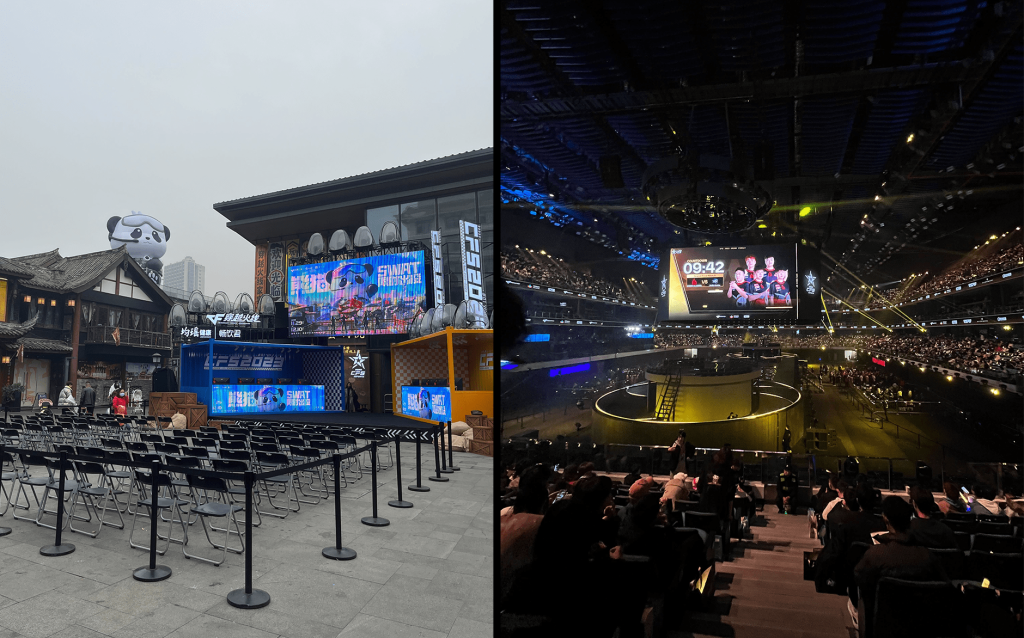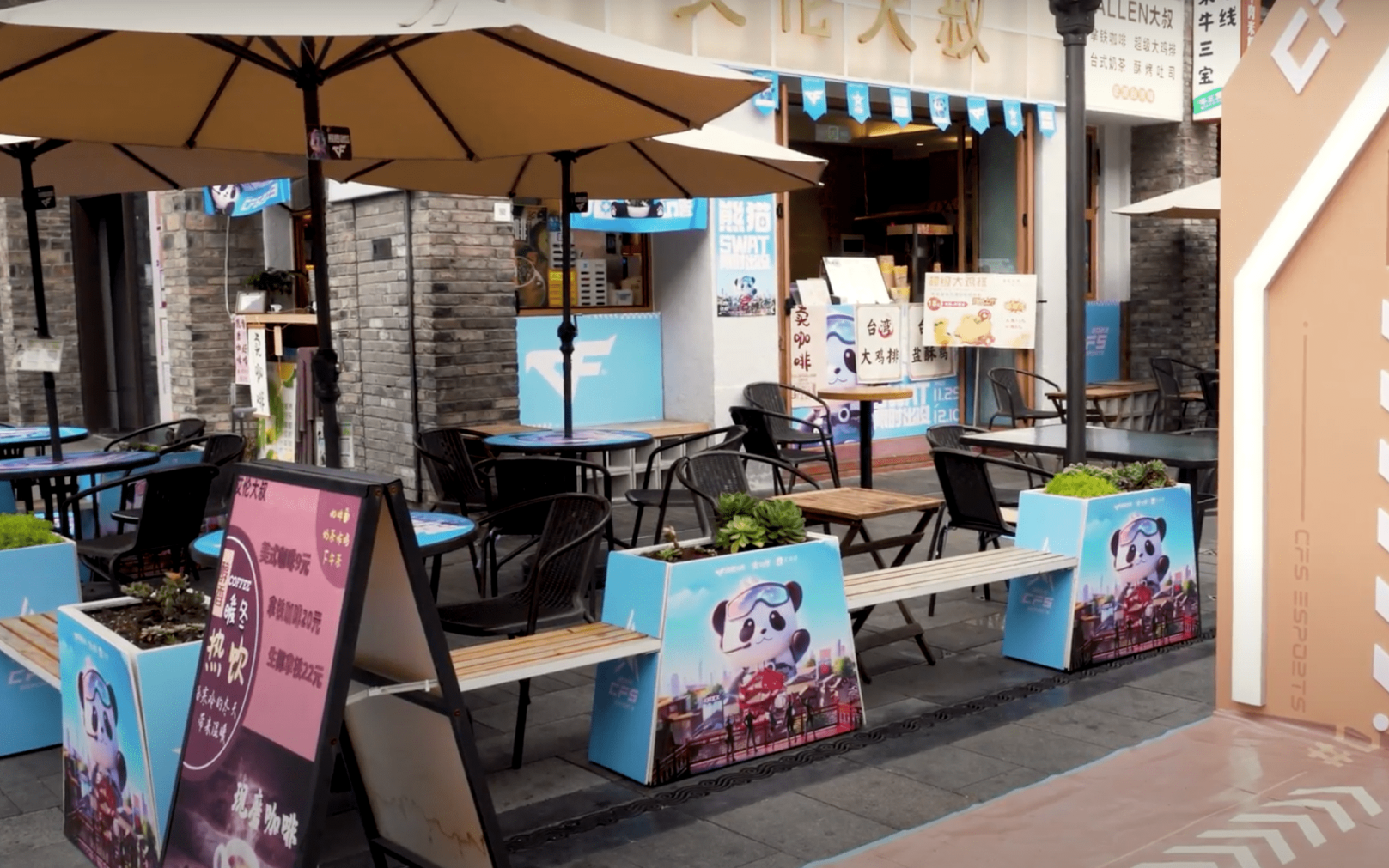Notifications
ALL BUSINESS
COMIDA
DIRECTORIES
ENTERTAINMENT
FINER THINGS
HEALTH
MARKETPLACE
MEMBER's ONLY
MONEY MATTER$
MOTIVATIONAL
NEWS & WEATHER
TECHNOLOGIA
TV NETWORKS
VIDEOS
VOTE USA 2026/2028
INVESTOR RELATIONS
COMING 2026 / 2027
ALL BUSINESS
COMIDA
DIRECTORIES
ENTERTAINMENT
FINER THINGS
HEALTH
MARKETPLACE
MEMBER's ONLY
MONEY MATTER$
MOTIVATIONAL
NEWS & WEATHER
TECHNOLOGIA
TV NETWORKS
VIDEOS
VOTE USA 2026/2028
INVESTOR RELATIONS
COMING 2026 / 2027
About Me
 Latinos Media
Latinos Media Latinos Media provides all types of news feeds on a daily basis to our Members
Posted by - Latinos Media -
on - January 16, 2024 -
Filed in - Esports -
-
632 Views - 0 Comments - 0 Likes - 0 Reviews

 All Gamers’ stall at the CROSSFIRE fan zone in Chengdu. Image credit: Esports Insider
All Gamers’ stall at the CROSSFIRE fan zone in Chengdu. Image credit: Esports Insider
Late last year, CROSSFIRE fans in China walked through WenShuFang Folk and Culture Street in Chengdu to watch the event’s world championship as well as meet local professional teams, all of which had fan stalls.
The CROSSFIRE STARS 2023 Finals weekend took place in the Chengdu Gaoxin Sports Centre with the esports scenes’ fanbase treated to an opening performance featuring cheerleaders and live music. It was during the finals between two Chinese teams — Chengdu All Gamers and BaiSha Gaming — that the benefits of localisation in esports became clear.
Released in 2007 by South Korean game developer Smilegate, CROSSFIRE is serviced in 80 countries and ranks highly in countries such as Brazil and Vietnam. In 2008, CROSSFIRE was brought into China and the game has since become one of the country’s most popular FPS titles.
By using clever marketing strategies, such as creating China-focused cosmetics and highlighting the game’s accessibility on low-end PCs, the game rose in prominence, with a dedicated esports scene also flourishing in the country. This included the development of a franchised esports league in China, the CFPL.
At CROSSFIRE STARS 2023, Smilegate’s Esports Global Operation Team Manager, Seong Hoon Lee, commented: “From the CFPL’s perspective, they always wanted to bring some changes to (CROSSFIRE’s esports) environment, a more stable environment to the franchise teams. Through that, we were able to adopt the franchise league system.”
Last year, the CFPL secured a 10-year partnership with a district in Chengdu, the same city that is hosting this year’s League of Legends MSI. Tencent’s CROSSFIRE Marketing Director, Chen Jin, told Esports Insider that the decision to make Chengdu the base of CROSSFIRE esports was considered for a long time. “Chengdu has very favourable policies, the government is very friendly.
“Besides the policies, we have more choices in the industry… we used to be in Jiangsu province and now in Chengdu there are a lot of universities. We have a lot of choice for fans of the games.”
CROSSFIRE’s esports ecosystem in China has provided a solid foundation for the game for many years, with the game being one of the biggest FPS titles in the country. Establishing and focusing on creating a ‘home base’ has provided the game with a stable scene whilst also attempting to grow in other countries, such as Brazil.
 Crossfire Stars 2023. (Left) CROSSFIRE STARS 2023’s fan zone in the morning. (Right) Chengdu Gaoxin Sports Centre. Image credit: Jack Fenton
Crossfire Stars 2023. (Left) CROSSFIRE STARS 2023’s fan zone in the morning. (Right) Chengdu Gaoxin Sports Centre. Image credit: Jack Fenton
Hoon Lee stated: “We are giving our best to provide a stable, playable environment to our pro league players. For our foreign professional leagues, such as CFBL (Brazil), CFWL (the West) and CFVL (Vietnam), it’s not just the prize pool; we also provide a programme called the Player Support Programme and it’s like monthly salary support directly given to the players. So we’ve given our best efforts to provide a very stable environment to the players.
“If only China is dominant, it’s not fun to watch, right? It’s not entertaining. What we’re trying to do is not just support China, but also support our professional teams from other regions.”
Whilst bolstering CROSSFIRE viewership outside of China is still a work in progress, the focus on creating greater ecosystems has led to Brazilian player Goken signing for a Chinese team — the current CROSSFIRE STARS 2023 Grand Finals Champions BaiSha Gaming — at the start of 2024.
Smilegate isn’t the only game developer to have a game excel in specific markets away from home. This has occurred with the likes of Chinese company Moonton tapping into the Southeast Asian esports market through Mobile Legends: Bang Bang, one of the most popular mobile scenes outside of China. From a game developer perspective, almost all major game publishers, such as Riot Games, have localisation teams that ensure their game content across a wide variety of titles are culturally impactful across different countries.
Nevertheless, this doesn’t mean that localisation has always worked in esports’ favour — Call of Duty League’s city-based franchise approach proved to be less effective, perhaps due to the league’s marketing and removal of established esports brands. As of 2024, Call of Duty’s esports scene is solely focused in North America, with no franchised teams based outside of Canada and the US.
There are a lot of factors that go into making sure connections are made with specific audiences. This tends to differ from region to region, making it equally as hard to utilise similar strategies across continents.
 A CROSSFIRE STARS branded cafe in Chengdu. Image credit: Esports Insider
A CROSSFIRE STARS branded cafe in Chengdu. Image credit: Esports Insider
China is the world’s largest esports market, according to Niko Partners research. Despite government restrictions on play time and in-game spending, the esports sector continues to generate huge revenues, all while countless new titles, such as VALORANT, enter the country.
According to VSPO Senior Vice President Xie ‘Old_Xie’ Yixian, one of the main factors in curating esports fandom in the country is performance. “For developing fan bases here in China, I believe it all boils down to the good performances of our players in esports. We’re also trying to generate this kind of celebrity phenomenon here in China.
“We also quite focused on the live-streaming interactions between the players and the fans. Apart from the performances of our players, we are also quite focused on the history, like the vendetta between these players.”
One example of a localised activation that proved to further cement CROSSFIRE in China was the release of a drama based on the video game title. According to South China Morning Post, in 2020 the show, Cross Fire, garnered 980m views in less than four weeks after its release.
With a multitude of esports titles already establishing large fanbases in China, such as Call of Duty: Mobile, Peacekeeper Elite (PUBG: Mobile), Nakura Bladepoint and Honor of Kings, the country has a blossoming esports ecosystem complete with largely China-focused tournaments. Whilst localisation for CROSSFIRE has worked in the country, there’s still a long way to go for the title — and esports in general — to become mainstream in China.
“We are fully aware that esports is not a mainstream culture here in China,” Yixian noted. “We will promote the positive spirits of esports like enthusiasm, competition, and striving forward to the wider society and try to eliminate the misunderstandings of esports.”
Yixian noted that a main factor in developing esports in the country is being able to tap into the rural areas. As a result, having a title that can be accessible with low-tech computers is still highly valuable in the market.
Smilegate, using its relationships with the likes of Tencent and VSPO, has ensured a long-term future for CROSSFIRE in China with its ecosystem spanning over 15 years. Whilst there are still ambitions to develop this sector globally, the ability to establish a dominant fanbase in China is just as impressive of a feat, particularly for a country that has traditionally shied away from the FPS genre until recently.
This article is supported by Smilegate. Esports Insider was a coverage partner for CROSSFIRE STARS 2023.